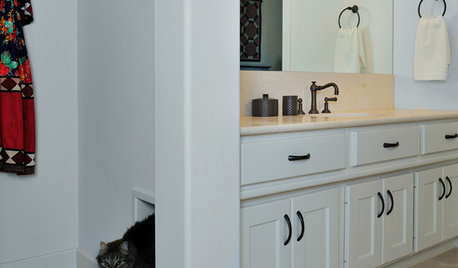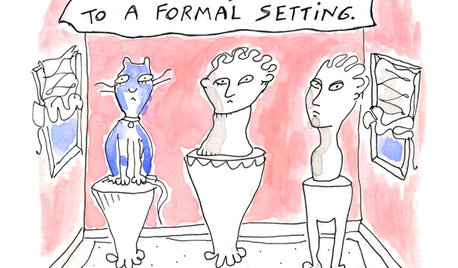Stray cat problem
Nif_NortheasternPA
18 years ago
Related Stories

DECORATING GUIDES5 Pet Problems Solved by Design
Design-Friendly Ideas for Pet Beds, Bowls, Doors — and yes, the Litter Box
Full Story
FURNITURESlipcovers: Problem Solvers With Style
9 Great Ways to Change Up Your Look With the Ever-Practical Slipcover
Full Story
LANDSCAPE DESIGNProblem Solving With the Pros: An Abundant Garden Stretches Its Means
Swaths of resilient, eye-catching plants thrive with little care or resources in the landscape of a Pennsylvania farmhouse
Full Story
REMODELING GUIDESThe Hidden Problems in Old Houses
Before snatching up an old home, get to know what you’re in for by understanding the potential horrors that lurk below the surface
Full Story
FEEL-GOOD HOMEBack Problems? Try Putting Your Feet Up
Consider these alternatives to that one-size-doesn’t-fit-all sofa to avoid slumping and spinal stress
Full Story
TASTEMAKERSICFF 2012 Report: 10 Visionary Problem Solvers
Sure, pretty is nice, but the best designs improve our lives. These innovative products by students and companies do just that
Full Story
PETS10 Tips for Keeping Indoor Cats Healthy and Happy
It's National Cat Day: Ask not what your cat can do for you (because it will ignore you) but what you can do for your cat
Full Story
PETSSo You Want to Get a Cat
If you're a cat lover, the joys outweigh any other issue. If you haven't lived with one yet, here are a few things to know
Full Story
PETSHouzz Call: Send in the Design Cats
Post your best photo of your cat at home, in the garden or with you in your studio. It could be published in a featured ideabook
Full Story
MOST POPULAR7 Ways Cats Help You Decorate
Furry felines add to our decor in so many ways. These just scratch the surface
Full StorySponsored
More Discussions






lisa11310
jillmcm
Related Professionals
Norfolk Landscape Architects & Landscape Designers · Wrentham Landscape Architects & Landscape Designers · Citrus Heights Landscape Architects & Landscape Designers · Benbrook Landscape Architects & Landscape Designers · Otsego Landscape Architects & Landscape Designers · Monterey Landscape Contractors · Olympia Landscape Contractors · Tuscaloosa Landscape Contractors · West Chester Landscape Contractors · Silver Firs Landscape Contractors · Des Plaines Driveway Installation & Maintenance · Fullerton Driveway Installation & Maintenance · Grand Rapids Driveway Installation & Maintenance · Leesburg Driveway Installation & Maintenance · Tucson Swimming Pool Buildersgarden4wildlife
lisa11310
Nif_NortheasternPAOriginal Author
deefar
lisa11310
baccr2
deefar
aka_peggy
jillhudock
deefar
aka_peggy
lisa11310
jillmcm
lisa11310
jillmcm
garden4wildlife
lazy_gardens
Violet_Z6
Ter73
smkymtn1drer